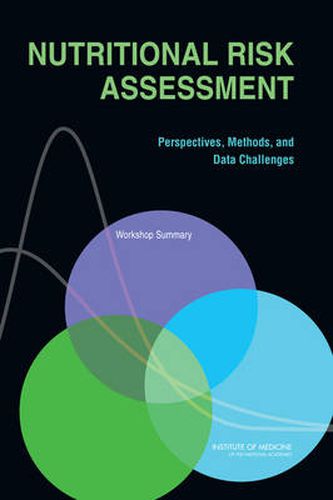Readings Newsletter
Become a Readings Member to make your shopping experience even easier.
Sign in or sign up for free!
You’re not far away from qualifying for FREE standard shipping within Australia
You’ve qualified for FREE standard shipping within Australia
The cart is loading…






For more than two decades, the practice of risk assessment has been applied to human public health issues, and policy makers have used the results of risk assessments in their decision-making process. Approaches for risk assessment have been developed for non-nutrients such as drugs, food additives, and pesticides, but approaches for risk assessment have received less attention in the nutrition area. Some aspects of the risk assessment approach used for non-nutrients are applicable to the assessment of risks related to nutrition. The overall approach, however, must be adapted and modified to take into account the unique aspects of nutrients, including the fact that both high and low nutrient intakes are associated with risk. Experience with the application of a risk assessment process to the setting of upper levels of intake for essential nutrients, for example, has uncovered a number of challenges. Adapting and developing risk assessment strategies for application in nutrition science could lead to improved approaches to the development of dietary and nutritional recommendations and thus is a topic of considerable interest. One non-scientific but overall challenge to nutritional risk assessment relates to increasing and improving communication among experts from key disciplines in ways that could inform the nutritional risk assessment process. Among these key disciplines are nutrition, toxicology, dietary exposure assessment, economics, risk analysis, and epidemiology. How can the perspectives and methods of these diverse fields be brought together to develop more effective approaches for quantitative nutritional risk assessment? How can they be applied to a spectrum of topics related to food and nutrition-micronutrients, macronutrients, dietary supplements, whole foods, food groups, and dietary patterns? How can they help overcome the data challenges that confront nutritional risk assessors? As a step toward improving the communication and sharing methods and information across disciplines, members of the Interagency Risk Assessment Consortium, the U.S. Health and Human Services Office of the Assistant Secretary for Planning and Evaluation, the Institute of Medicine’s Food Forum, and the International Life Sciences Institute planned the Nutritional Risk Assessment Workshop. The workshop was held on February 28 and March 1, 2007, in Washington, D.C. This workshop, which was envisioned as one in a series, focused on opening a dialogue to explore the unique questions and challenges faced by nutritionists and the potential use of risk assessment methodologies to answer them. Nutritional Risk Assessment : Perspectives, Methods, and Data Challenges, Workshop Summary summarizes the happenings of this workshop.
$9.00 standard shipping within Australia
FREE standard shipping within Australia for orders over $100.00
Express & International shipping calculated at checkout
For more than two decades, the practice of risk assessment has been applied to human public health issues, and policy makers have used the results of risk assessments in their decision-making process. Approaches for risk assessment have been developed for non-nutrients such as drugs, food additives, and pesticides, but approaches for risk assessment have received less attention in the nutrition area. Some aspects of the risk assessment approach used for non-nutrients are applicable to the assessment of risks related to nutrition. The overall approach, however, must be adapted and modified to take into account the unique aspects of nutrients, including the fact that both high and low nutrient intakes are associated with risk. Experience with the application of a risk assessment process to the setting of upper levels of intake for essential nutrients, for example, has uncovered a number of challenges. Adapting and developing risk assessment strategies for application in nutrition science could lead to improved approaches to the development of dietary and nutritional recommendations and thus is a topic of considerable interest. One non-scientific but overall challenge to nutritional risk assessment relates to increasing and improving communication among experts from key disciplines in ways that could inform the nutritional risk assessment process. Among these key disciplines are nutrition, toxicology, dietary exposure assessment, economics, risk analysis, and epidemiology. How can the perspectives and methods of these diverse fields be brought together to develop more effective approaches for quantitative nutritional risk assessment? How can they be applied to a spectrum of topics related to food and nutrition-micronutrients, macronutrients, dietary supplements, whole foods, food groups, and dietary patterns? How can they help overcome the data challenges that confront nutritional risk assessors? As a step toward improving the communication and sharing methods and information across disciplines, members of the Interagency Risk Assessment Consortium, the U.S. Health and Human Services Office of the Assistant Secretary for Planning and Evaluation, the Institute of Medicine’s Food Forum, and the International Life Sciences Institute planned the Nutritional Risk Assessment Workshop. The workshop was held on February 28 and March 1, 2007, in Washington, D.C. This workshop, which was envisioned as one in a series, focused on opening a dialogue to explore the unique questions and challenges faced by nutritionists and the potential use of risk assessment methodologies to answer them. Nutritional Risk Assessment : Perspectives, Methods, and Data Challenges, Workshop Summary summarizes the happenings of this workshop.